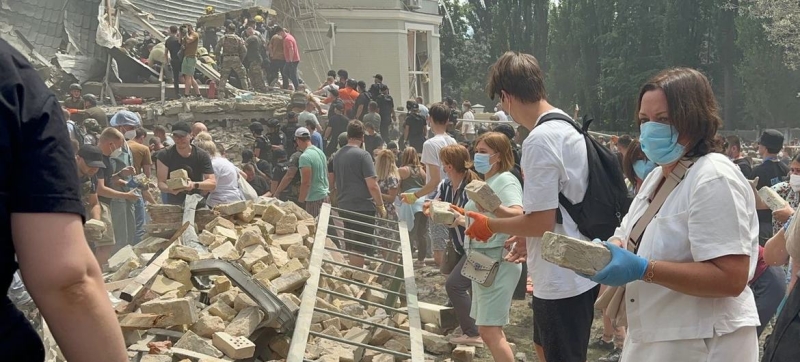
Russian attacks are damaging Ukraine’s civilian infrastructure, including energy facilities, schools and hospitals. (Photo from archive) Half a million people will be forced to leave Ukraine due to Russian attacks on the country’s energy grid International law
Russia’s ongoing attacks on Ukraine’s energy infrastructure, causing power outages, are likely to force about 500,000 more people to flee their homes ahead of winter, UN human rights experts said on Thursday.
Among the latest strikes on Ukraine’s power grid was a coordinated attack on August 26 that experts from the UN Human Rights Monitoring Mission in the country described as one of Russia’s largest attacks since the start of a full-scale invasion. It involved “more than 100 missiles and 100 drones in many regions of Ukraine, primarily targeting energy and other infrastructure.”
“Power outages were implemented across the country to stabilize the grid,” the mission report said.
It also said that between March 22 and August 31, 2024, “nine waves of long-range and large-scale coordinated attacks” were recorded on Ukraine’s electricity grid, which either damaged or destroyed “numerous electricity generation, transmission, and distribution facilities” and caused damage to civilians, water supply, sewerage, and heating systems.
The report also estimates that recent attacks on energy infrastructure have left more than 10 percent of the population – 3.7 million people – at risk of consuming contaminated drinking water. Young children, the elderly, people with weakened immune systems and people with serious illnesses are particularly at risk in this context,” the report says.
Ukraine Loses Half of Its Energy Capacity
According to the Mission, since March 2024, Russian attacks have hit targets in 20 of the 24 regions under Ukrainian control, including Kyiv. In particular, 36 strikes were carried out on power plants in nine regions and at least 101 strikes were carried out on electricity distribution and transmission facilities in 17 regions.
“Many energy facilities have been hit repeatedly, in some cases resulting in their complete destruction,” the mission’s report says. Experts say repairs and restoration will take years.
Before Russia’s full-scale invasion, Ukraine had 44 gigawatts of available energy capacity from nuclear, thermal, hydroelectric and renewable energy sources, the report says, citing data from the National Bank of Ukraine. But by April 2023, due to occupation and destruction, Ukraine’s national energy system had lost almost half of its available production capacity. In addition, 42 of 95 high-voltage transformers were damaged, disrupting power supply to homes.
Displacement concerns
According to the UN Refugee Agency (UNHCR), more than 6.7 million Ukrainians have fled the country since the Russian invasion. Some 6.2 million live in Europe, while another 3.6 million are internally displaced inside Ukraine. UNHCR says it is “unlikely” that these numbers will decrease anytime soon.
Border monitoring by the agency and its partners has shown that since April this year there has been a slight increase in the number of people leaving Ukraine due to a lack of access to electricity, water and heating. However, the figure has increased sharply in the summer as power outages have become more frequent. By July, almost half of those surveyed at the Ukrainian border said they were leaving because of difficulties accessing electricity, water and heating.
“The majority of those leaving for energy-related reasons intend to stay abroad temporarily, but for an indefinite period,” the UNHCR said.
Education: Millions of classroom hours lost
The latest waves of attacks have also had a serious impact on the education system. In July 2024, the United Nations Children’s Fund (UNICEF) estimated that Ukrainian schoolchildren were losing invaluable hours of learning due to power outages.
According to the National Bank of Ukraine, the waves of attacks will lead to a reduction in the country’s GDP. By June 2024, electricity prices had risen by more than two-thirds. The government estimates that high energy costs will increase inflation by 1.2 percent and add six percent to producers’ costs.
Violation of International Law
The monitoring mission stated that given the large number of regions affected by the coordinated attacks, “the high precision of the weapons used and the enormous scale of the damage inflicted on the civilian population and the interconnected civilian systems that provide the population with services essential to its health and survival… there are reasonable grounds to believe that multiple aspects of the military campaign to damage or destroy Ukraine’s civilian electricity and heat production and transmission infrastructure violated fundamental principles of international humanitarian law.”
